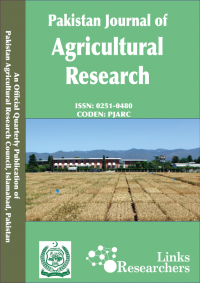Nasreen Sultana* and A.Ghaffar**
ABSTRACT
The effect of fungicides and microbial antagonists in the control of Lasiodiplodia theobromae , the cause of seed rot, seedling and root infection on bottle gourd was studied in vitro and in vivo. Carbendazim and Topsin-M completely inhibited the growth of L. theobromae in vitro at 50 ppm whereas Aliette, Benlate, Mancozeb, Ridomil and Vitavax showed complete inhibition of colony growth at 100 ppm. Invariably all fungicides at three different concentration viz., 1, 2, 3 g (a.i.) kg-1 seeds reduced the recovery of the seed borne fungi. The most effective seed treatments were Benlate, Topsin-M, Carbendazim and Aliette @ 3 g kg-1 seeds which enhanced seed germination and reduced seed infection in bottle gourd. Trichoderma harzianum, T. viride, Gliocladium virens, Stachybotrys atra and Bacillus subtilis showed better results in the control of pre- and post-emergence infection of L. theobromae in seedling of bottle gourd in vitro and in vivo. G. virens has been found most effective to reduce seed and root infection in vivo whereas B. subtilis performed best to reduce seed and seedling infection of bottle gourd in vitro.
To share on other social networks, click on any share button. What are these?






